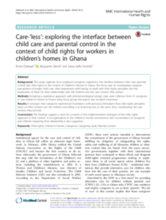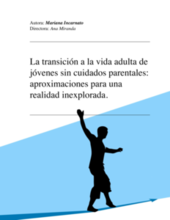Displaying 711 - 720 of 1510
This paper aims at describing how caregivers at an institution for motherless infants in rural Tanzania perceive infancy, caring and sensitivity in their everyday context.
This study explored how employed caregivers experience the interface between child care, parental control and child rights in the context of Children’s Homes in Ghana.
The present research aimed to describe and compare three new second-level intervention models to improve the care of unaccompanied migrant minors in Italy.
The objective of this study was to determine if the Power Through Choices (PTC) intervention can increase the use of birth control and reduce pregnancy among system-involved youths living in group care homes.
This study sought to investigate the lived experiences of care leavers from institutional care facility in Botswana.
This study aimed to assess both the prevalence of stress and the coping mechanisms as well as identify the predictors of stress levels among adolescents in Malaysian orphanages.
This article reports the findings of a multi-country study of medical professionals' perceptions and evaluations of children in three Eastern European countries (Romania, Bulgaria, Moldova).
El trabajo se centra en el análisis de las trayectorias de un grupo de 199 adolescentes y jóvenes que viven o han vivido institucionalizados por una medida excepcional de cuidado, en siete provincias argentinas.
The Bucharest Early Intervention Project sought to examine the effects of foster care as an alternative to institutional care for abandoned infants in Romanian institutions.
In the current study the authors examined associations between children's pre-adoption experiences (type of pre-adoption care and early deprivation) and their adaptive and maladaptive behavioral adjustment.


